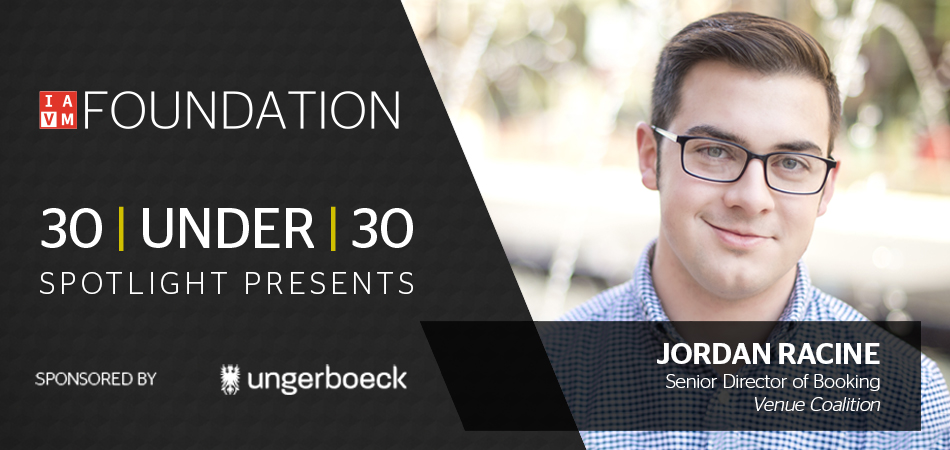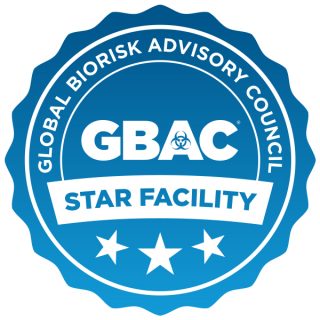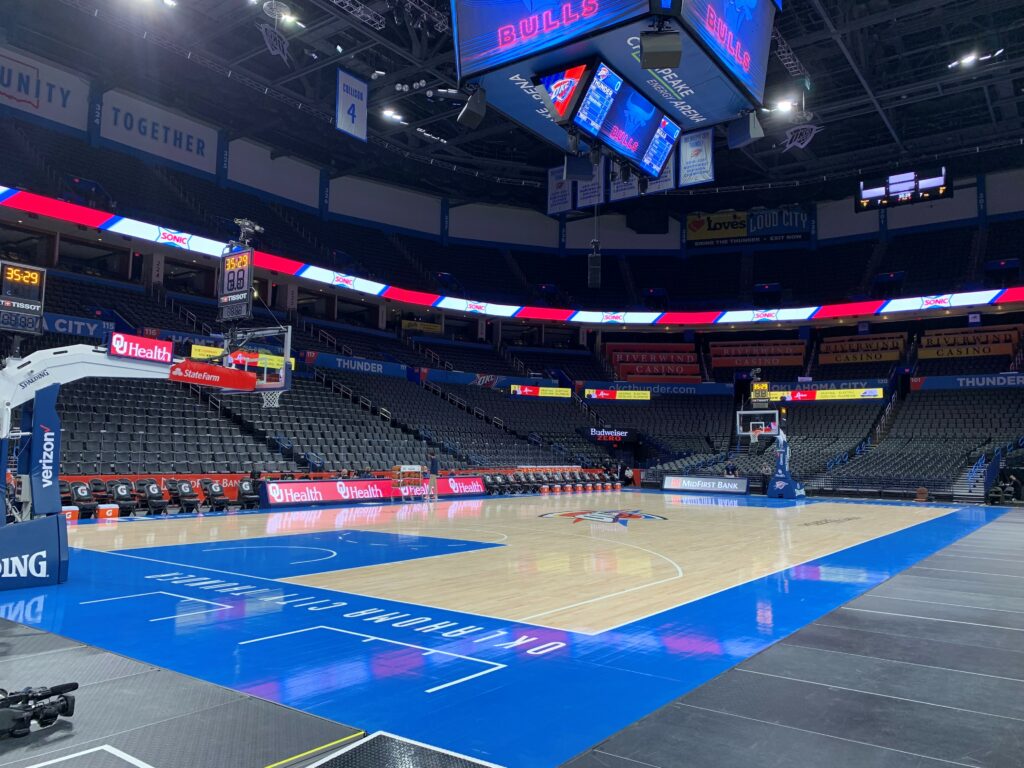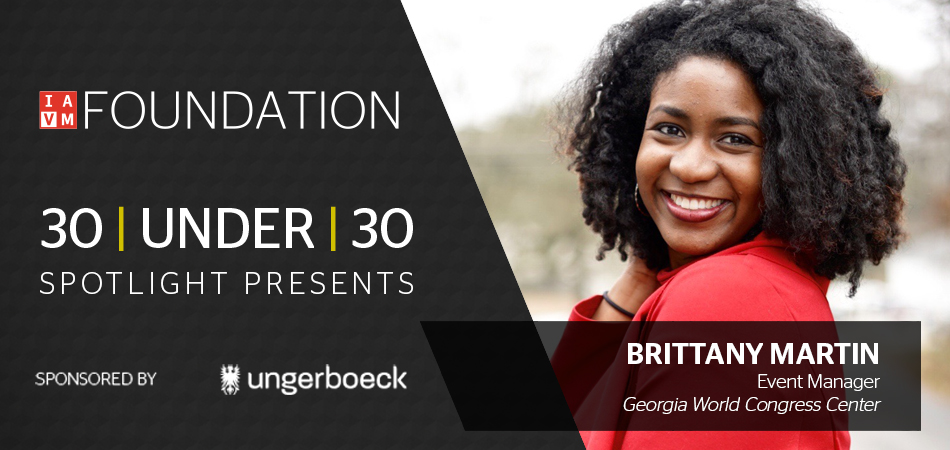30|UNDER|30 Spotlight: Jordan Racine

Senior Director of Booking, Venue Coalition
Jordan Racine joined Venue Coalition as a Booking Assistant in 2016 after graduating from Northern Vermont University – Lyndon with a bachelor’s degree in their Music Business and Industry program. While attending NVU, Jordan developed a strong interest in the business of concert booking and promotion. In 2015, he was selected to work as an intern with James Taylor’s production team during various one-off performances, and a US Tour that same year. As Director of Booking at Venue Coalition, Jordan now works hard to identify booking opportunities for his venue clients, focuses on business development, and executes the booking of live events for over 70 Arenas in North America.
“When I was notified that I had won IAVM’s 30 Under 30 award, I was overwhelmed with feelings of accomplishment and pride, as this was my second time being nominated. I felt honored to be included in a group of young professionals who are all as passionate about the venue industry as I am”
Join your Foundation in congratulating Jordan on being honored as one of the 30|UNDER|30 Class of 2020 and don’t forget to come back each Thursday as we spotlight another honoree!
Another 126 Facilities Earn GBAC STAR Accreditation, Including More IAVM Venues
By ISSA and R.V. Baugus
This week, 126 additional facilities have achieved GBAC STAR™ Facility Accreditation from the Global Biorisk Advisory Council™ (GBAC), a Division of ISSA, demonstrating their commitment to cleanliness, health, and safety. As is the norm, IAVM member venues stand front and center in earning the highly sought designation.
“GBAC STAR accredited facilities make proper cleaning and disinfection an ongoing priority,” said GBAC Executive Director  Patricia Olinger. “We are excited to witness the work that organizations are putting into protecting their employees and the public, now and in the future.”
Patricia Olinger. “We are excited to witness the work that organizations are putting into protecting their employees and the public, now and in the future.”
The GBAC STAR Facility Accreditation Program is designed to guide facilities on cleaning, disinfection, and infection prevention, and instill confidence in those who work and visit these places. Facilities of all types and sizes are eligible to pursue GBAC STAR accreditation and must fulfill 20 program elements to display the GBAC STAR seal.
The following facilities have achieved GBAC STAR accreditation this week:
Arenas/Stadiums
Amalie Arena in Tampa, Fla., home to the NHL’s Tampa Bay Lightning
American Airlines Arena in Miami, home to the NBA’s Miami Heat
Amway Center in Orlando, Fla., home to the NBA’s Orlando Magic
Golden 1 Center in Sacramento, Calif., home to the NBA’s Sacramento Kings
Dr. Pepper Ballpark in Frisco, Texas, home to the MiLB’s Frisco RoughRiders
Great Park Ice and Five Point Arena in Irvine, Calif., the practice facility for the NHL’s Anaheim Ducks
Smith’s Ballpark in Salt Lake City, home to the MiLB’s Salt Lake Bees
The Gallivan Center in Salt Lake City
Wings Event Center in Kalamazoo, Mich.
Convention Centers
Oregon Convention Center in Portland, Ore.
TCU Place in Saskatoon, Saskatchewan
Waco Convention Center in Waco, Texas
Museum/Cultural Venue
Sacramento Memorial Auditorium in Sacramento, Calif.
Theatres/Performing Arts Centers
SAFE Credit Union Performing Arts Center in Sacramento, Calif.
The VETS in Providence, R.I.
“A good cleaning and disinfection program must include consistent training and preparation,” said ISSA Executive Director John Barrett. “GBAC STAR accredited facilities commit to educating their cleaning personnel so that the organization can prepare for, respond to, and recover from outbreaks.”
For more information about GBAC STAR™ facility accreditation, visit gbac.org/star.
NBA Season Underway; More IAVM Member Venues Share Info About Fan Attendance
By R.V. Baugus
We hope you read last week’s blog about IAVM member venues that serve as home to NBA teams and their plans for the new season with regards to fan attendance. We had a great response to some questions as the season has now started and most recently heard from two more esteemed members at NBA venues and would like to share their plans going forward.
Kim Stone, General Manager of Chase Center in San Francisco, home to the Golden State Warriors, said that her venues has submitted a plan to the city of San Francisco “that included a robust COVID-19 testing program where we would test every employee and fan before they entered the arena and allow for 50% capacity.”
Stone added that with San Francisco’s rapid rise in COVID-19 cases, “we’re in ongoing discussions with health officials around the appropriate timing to welcome fans back to the venue. We are hopeful that at some point, we will be at a place where we can bring fans back into the building this season.”
Indeed, NBA venues in Los Angeles and Sacramento are also looking at no fans to begin the season, but as Stone pointed out, the goal and hope is to return fans at some point in the 2020-21 campaign. As for changes at Chase Center, there are plenty, of course, set in place for the day when fans do return.
“We created a Health and Hygiene department that focuses on public health, environmental, and disinfection issues and have greatly enhanced our safety and cleaning protocols,” Stone said. “We’ve invested a lot in our infrastructure adding plexiglass barriers throughout the arena, touchless fixtures in restrooms, we are now 100% cashless and did some upgrades to our HVAC system to ensure the best air quality possible.”
Stone said that a unique testing program was rolled out for employees, media, vendors, and other individuals who require access to the venue where everyone needs to test negative prior to entering the arena. “In addition to the infrastructure improvements, we will also have a dedicated team that will be responsible for constantly walking the venue to audit cleanliness levels and ensure proper sanitizing by staff and have implemented the daily use of electrostatic sprayers in high-touch areas,” she said.
It is this program that Stone sees as the biggest change at the venue. “It was an incredible achievement for our staff, who spent the last few months developing the plan, and it ensures Chase Center, coupled with our infrastructure improvements and enhanced safety protocols, is the safest indoor environment possible,” she said.
In an ominous twist, the Oklahoma City Thunder’s season opener in Houston could not be played as the host Rockets were  not able to field the minimum eight players due to COVID issues. In OKC, meanwhile, General Manager Chris Semrau at Chesapeake Energy Arena said that the venue will also delay opening to fans and will begin with no guests. Semrau added that when fans do return it will likely be at 25% capacity and set up in pods.
not able to field the minimum eight players due to COVID issues. In OKC, meanwhile, General Manager Chris Semrau at Chesapeake Energy Arena said that the venue will also delay opening to fans and will begin with no guests. Semrau added that when fans do return it will likely be at 25% capacity and set up in pods.
“We made extensive investments to elevate the event experience and to be a safe as possible for guests,” Semrau said. “Some of the most noticeable changes include: contactless entry with ticket scanners, x-ray machine for all bags, cashless transactions at all POS, reconfigured restaurants to minimize amount of contact in the dining areas, touchless faucets and light fixtures, improved HVAC elements, Hepa air systems in small rooms, seat blockers on unsold seats to provide clear distancing, etc.”
Staff will go through specific training, pass a health assessment prior to entering the facility, and provided a boxed meal upon arrival opposed to the employee dining room. The biggest visual changes, Semrau said, will be contactless ticket and bag scanning, which limits the physical touches between guests and staff.
Oklahoma City, you might remember is where the sports world stopped on March 11 of this year. “It was at our game against the Utah Jazz when we received a positive test on a Jazz player and had to immediately stop the game,” Semrau said. “That was the first major domino to fall in the industry and since then, over 100 members of the Thunder and ASM Global have collaborated to create one of the most detailed reopening plans in the country and we are excited to apply it and welcome guests back soon.”
IAVM Social Media Brings Holiday Cheer to Sam Dores, CVP
By R.V. Baugus
Sam Dores, CVP, Director, Business Operations, Strategy and Development at ExtraMile Arena in Boise, ID, and one of IAVM’s hardest-working and most dedicated volunteers, sent an email the other day to share how the weekly IAVM blogs as well as the social media ask-and-answer VenueNet, has come to his aid recently. We will let Sam take it from here:
“I wanted to share a success story from the IAVM blogs. We found out late yesterday that we’ve been tasked with hosting a  food distribution site in our parking lot in a few short days. Scrambling to find some ideas on how to run an event like this, I Googled, ‘IAVM food distribution site’ and had several IAVM blog stories come up – Berry Center, Alamodome, Fair Park, etc. I blindly reached out to each and Beth Wade (Berry Center) responded in minutes and then both Steve Zito and Eric Blockie from Alamodome gave me 10-15 minutes of their time. Couldn’t have done it without the original blog stories pointing me in the right direction (not to mention the always generous industry colleagues!)!
food distribution site in our parking lot in a few short days. Scrambling to find some ideas on how to run an event like this, I Googled, ‘IAVM food distribution site’ and had several IAVM blog stories come up – Berry Center, Alamodome, Fair Park, etc. I blindly reached out to each and Beth Wade (Berry Center) responded in minutes and then both Steve Zito and Eric Blockie from Alamodome gave me 10-15 minutes of their time. Couldn’t have done it without the original blog stories pointing me in the right direction (not to mention the always generous industry colleagues!)!
“I would also add that the outpouring of information provided on and off VenueNet has been tremendous as well! A lot of great responses and in-depth information both on the board and directly to my email.”
Don’t miss out on what Sam is talking about. As we all continue navigating through the pandemic and with 2021 looming around the corner, VenueNet is the go-to forum to ask your questions to your industry colleagues and peers. Many a testimonial has been shared about the value of VenueNet, so if you are not acquainted with it then by all means make it one of your 2021 resolutions.
As Sam mentioned, our weekly blogs will continue to tackle the news within our industry and especially how our valued IAVM members continue making huge differences in their communities.
Thank you, Sam, for the nice email to help us bid adieu (finally!) to 2020 and look with great optimism and anticipation toward the new year.
30|UNDER|30 Spotlight: Brittany Martin

Event Manager, Georgia World Congress Center
As a proud Alumna of the University of South Carolina, Brittany Martin is an ambitious and dedicated Event Professional with experience in conventions, large galas, and concert productions. Being detail oriented, embracing new and creative ideas, and bringing people together for life changing experiences is what drove her to the Event and Entertainment Industry. She is currently employed as an Event Manager at the Georgia World Congress Center.
Join your Foundation in congratulating Brittany on being honored as one of the 30|UNDER|30 Class of 2020 and don’t forget to come back each Thursday as we spotlight another honoree!
Do you want to receive a Front Row News weekly digest?
Categories
- Allied (856)
- Architecture (147)
- Arenas (744)
- Career (890)
- Convention Centers (889)
- Education (608)
- Events (1,528)
- Food & Beverage (193)
- Foundation (113)
- Guest Experience (1,482)
- Industry News (2,253)
- Leadership (1,872)
- Marketing (150)
- Membership (1,985)
- Music (212)
- Performing Arts Centers (453)
- Professional Development (398)
- Research (127)
- Safety & Security (425)
- Sports (763)
- Stadiums (607)
- Student (159)
- Technology (515)
- Ticketing (92)
- Touring (82)
- Trends (357)
- Uncategorized (771)
- Universities (216)
- Video (25)
- Young Professional (198)
Twitter Feed
- Twitter feed loading
Recent Posts
- GEODIS Park Selects Allied Universal As Its Preferred Event Services Provider
- Venuworks Appoints Marc Solis as Executive Director of the Fresno Convention and Entertainment Center
- Los Angeles Convention Center Diverts 8,000 Pounds of Wood Waste to Local Foundation Supporting Fire Victims
- Fort Worth Unveils Plans for Phase 2 of Convention Center Transformation
- San Diego Convention Center CEO Announces Retirement After a Decade of Leadership
Categories
- Allied
- Architecture
- Arenas
- Career
- Convention Centers
- Education
- Events
- Food & Beverage
- Foundation
- Guest Experience
- Industry News
- Leadership
- Marketing
- Membership
- Music
- Performing Arts Centers
- Professional Development
- Research
- Safety & Security
- Sports
- Stadiums
- Student
- Technology
- Ticketing
- Touring
- Trends
- Uncategorized
- Universities
- Video
- Young Professional
Archives
- February 2026
- January 2026
- December 2025
- November 2025
- October 2025
- September 2025
- August 2025
- July 2025
- June 2025
- May 2025
- April 2025
- March 2025
- February 2025
- January 2025
- December 2024
- November 2024
- October 2024
- September 2024
- August 2024
- July 2024
- June 2024
- May 2024
- April 2024
- March 2024
- February 2024
- January 2024
- December 2023
- November 2023
- October 2023
- September 2023
- August 2023
- July 2023
- June 2023
- May 2023
- April 2023
- March 2023
- February 2023
- January 2023
- December 2022
- November 2022
- October 2022
- September 2022
- August 2022
- July 2022
- June 2022
- May 2022
- April 2022
- March 2022
- February 2022
- January 2022
- December 2021
- November 2021
- October 2021
- September 2021
- August 2021
- July 2021
- June 2021
- May 2021
- April 2021
- March 2021
- February 2021
- January 2021
- December 2020
- November 2020
- October 2020
- September 2020
- August 2020
- July 2020
- June 2020
- May 2020
- April 2020
- March 2020
- February 2020
- January 2020
- December 2019
- November 2019
- October 2019
- September 2019
- August 2019
- July 2019
- June 2019
- May 2019
- April 2019
- March 2019
- February 2019
- January 2019
- December 2018
- November 2018
- October 2018
- September 2018
- August 2018
- July 2018
- June 2018
- May 2018
- April 2018
- March 2018
- February 2018
- January 2018
- December 2017
- November 2017
- October 2017
- September 2017
- August 2017
- July 2017
- June 2017
- May 2017
- April 2017
- March 2017
- February 2017
- January 2017
- December 2016
- November 2016
- October 2016
- September 2016
- August 2016
- July 2016
- June 2016
- May 2016
- April 2016
- March 2016
- February 2016
- January 2016
- December 2015
- November 2015
- October 2015
- September 2015
- August 2015
- July 2015
- June 2015
- May 2015
- April 2015
- March 2015
- February 2015
- January 2015
- December 2014
- November 2014
- October 2014
- September 2014
- August 2014
- July 2014
- June 2014
- May 2014
- April 2014
- March 2014
- February 2014
- January 2014
- December 2013
- November 2013
- October 2013
- September 2013
- August 2013
- July 2013
- June 2013
- May 2013
- April 2013
- March 2013
- February 2013
- January 2013
- May 2012
- March 2012
- December 2011
- November 2011
- October 2011
Recent Comments
- Frank Bradshaw, Ph.D., CVE on John Meyer, CVE, a Tireless Advocate of Certification for Venue Professionals, Has Died
- Neil Sulkes on Hilary Hartung, Friend to Many in Venue Marketing, Has Left Us
- Jason Parker, CVE on The Devastation of Hurricane Helene and How We Can Support One Another
- Larry Perkins on Touhey Testifies Against Speculative Ticketing Before Congressional Subcommittee
- Peter Secord on Major Players for Planned Elkhart Amphitheater Were in the Mix at VenueConnect
